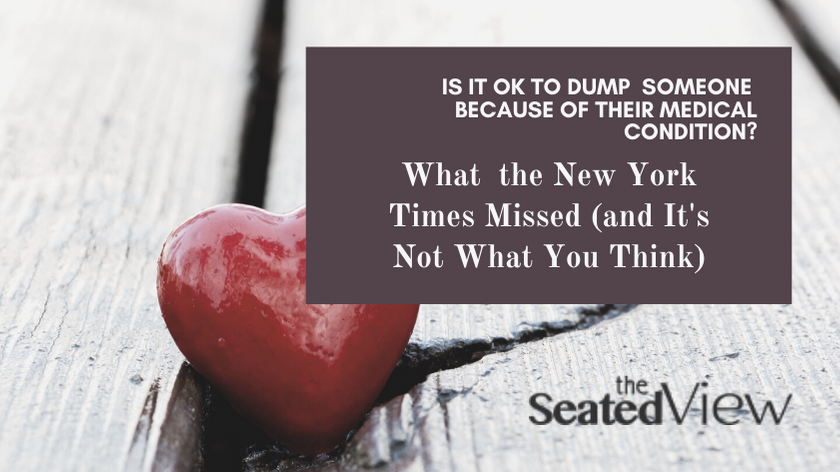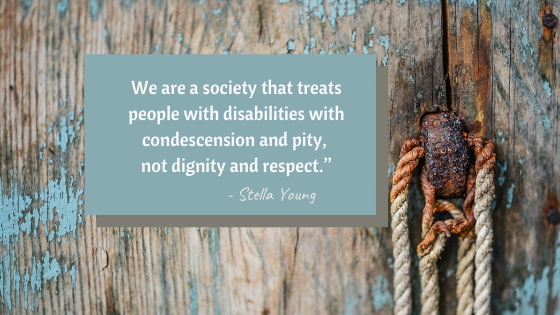Is it OK to Dump Someone Because of Their Medical Condition? Why the New York Times Got It Wrong (and It’s Not What You Think)

“I just can’t handle it.”
I’d bet the majority of people who have a chronic illness or disability have had that conversation when dating. That is, if you’re lucky. There are also the infinite number of times when you’re just ghosted — the person just disappears as if exorcised from your life. Earlier this week, The Ethicist column in the New York Times dealt with this problem, under the click-baity title “Is It Okay to Dump Him Because of His Medical Condition?” And people had issues with the answer, calling out the columnist for perpetuating the stereotype. But to me, everyone was missing a much larger issue.
The romance part of it
The Ethicist is a sort of ethical “agony aunt” — letter writers ask an ethical question, Kwame Anthony Appiah (philosopher and novelist) answers them. In this particular case, the letter writer was struggling with their inability to handle a potential future with a man who has Crohn’s, stating “I want to shield myself from the pain” — i.e., of the potential for the Crohn’s getting worse and possibly shortening the man’s life.
Cue eyeroll — for a couple of reasons.
“Can’t handle it” happens because people with chronic illness and disability are considered damaged goods in general, and specifically in the romance department, so much so that many are seen as asexual. If I had a dollar for every time someone has asked if The Boy is my brother, my retirement would be secure. It’s infuriating, disheartening, and credibly hurtful to be disregarded as a potential anything, just because your body isn’t perfect.

But my eye roll was also due to something entirely different that took me a very long time to learn. When someone tells you that they “can’t handle it,” it’s actually a blessing. If they can’t handle who you are now (and all that this entails), it shows a lack of mental and emotional flexibility that would like to have them running screaming for the hills for other reasons in the future. You want someone who sees you as a whole person, with all your beauty and talent and flaws and quirks you need to work around — together. So in that respect, I think the ethicist was right when he said it might be okay to hightail it. Because — don’t forget — he also said that it was okay only because the two people involved were not in an established relationship.
I saw a lot of talk about dropping the New York Times because of the column, but I disagree rather vehemently with cancel culture. I felt it was really important to call The Ethicist on his ableism through writing him and the newspaper and challenging them to do better. Many did and to his credit, Mr. Appiah amended the column after receiving what I can only imagine was a torrent of reader mail.
But they all missed a really big issue.

Disabled lives matter
Ableism is pervasive in our culture. People who live with disability and chronic health conditions are damaged goods to such a point that not only are we often seen as asexual, but also not really real people.
Sounds strong? Uncomfortable? How else do you explain that it is next to impossible to get any traction or discussion about discrimination against people with disabilities? A few months ago, there was a fair bit of noise in the community about the way disability and chronic health conditions were considered exclusion criteria for receiving ventilator care in case of severe COVID-19. The reaction in the able-bodied world was…
<crickets>
Disability advocates were screaming at the top of their lungs that governments and hospitals were comfortable quite literally killing some of the most vulnerable in our society — perhaps not actively, but by excluding from care, guaranteeing death — and no one cared. I have a handy little test to check if something is discrimination: substitute any other group and if the sentence makes your stomach hurt, then guess what? Discrimination. In this case, imagine that governments and hospitals have decided to exclude advanced COVID-19 care from non-white people, Indigenous people, or women.
Makes your stomach hurt, doesn’t? That’s outrage.
Although disability is a protected ground in every human rights legislation out there, it’s very clear that disability rights are actually just privileges. Because privileges can be taken away while human rights cannot.
When the ethicist of the New York Times’s failed to call out the inherent ableism in the question of whether it’s okay to dump someone because of their medical condition… Well, that just illustrates that discrimination against people with disabilities and chronic medical conditions is so systemic in our culture that it’s invisible. To the general public and even to someone who makes a living considering the ethics of it all.
Allies are essential. But first we need you to recognize our humanity.
Tag: .disability, allies, chronic illness, dicrimination, ethics, love, new york times, relationships, rheumatoid arthritis
2 Comments
Read More
Discover what else I've been writing about...
















A buddy of mine was hurt in a serious accident and as the recovery dragged on the marriage (based on being small business owners ) came apart. She needed action spirit, tough was OK, so long as they were going toward the goal of a successful business. He needed hugs and care and a driver.
They ended up divorced, they decided to build him a house especially set up for his new situation and she ended up selling the business and moving on. Was this a tragic situation? Not really. They of course grew to dislike each other. She was bitter he was angry and both were better off.
In three years, he remarried, a wonderful lady who adored him, she devoted her life to him. The ex wife? No idea. But at least they were adult enough to say disability is not a good reason to stay together, or to break up. Instead they what really broke them ups for the every day pressure of business and marriage. Just human stuff not disability stuff.
It alarms me how pervasive this is. It’s absolutely invisible. Only twice in my fully able-bodied life have I SEEN it — pregnant and confined to the hospital on bedrest, when I could only move about in a wheelchair did I notice how everything is designed so badly! The world looked totally different in that seat! And right now as I hop about on crutches recovering from knee surgery how I can hardly do anything with just one leg and no hands. I wonder, why don’t sinks turn on with the tap of a foot or knee or bump of the elbow? — And now with two special-needs children I am always aware of it. But it disturbs me greatly that MY life had to first be disturbed before I got it. That, as you said, is systemic. I shouldn’t have to live the experience to recognize there’s a problem that needs correcting. I’m a black woman and thus WELL acquainted with pervasive, invisible, systemic discrimination (i.e. cruelty) that cost lives and livelihoods, relationships and respect. And I get just as fired up about abolishing them, even if it’s not affecting me most directly. Fight on!